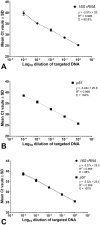Improved molecular detection of Neorickettsia risticii with a duplex real-time PCR assay in the diagnosis of Potomac horse fever
- PMID: 36373552
- PMCID: PMC9751466
- DOI: 10.1177/10406387221135184
Improved molecular detection of Neorickettsia risticii with a duplex real-time PCR assay in the diagnosis of Potomac horse fever
Abstract
Neorickettsia risticii, an obligate intracellular bacterium, is the causative agent of Potomac horse fever (PHF). Diagnosis of PHF is based on demonstration of serum antibodies, isolation of N. risticii, and/or detection of nucleic acid by a PCR assay. An existing real-time PCR assay targeting the N. risticii 16S rRNA has been validated using blood samples from horses with colitis, and snails; to our knowledge, the performance of the assay for other sample types has not been reported. We describe here a modification of the 16S rRNA gene assay by the addition of a set of primers and probe targeting the N. risticii p51 gene to form a duplex assay. We validated the new assay using diagnostic specimens from 56 horses with suspected PHF. The assay consistently detected down to 5 copies of synthetic targets, and did not show any cross-reaction with common equine enteric pathogens. Although we did not establish the diagnostic sensitivity and specificity of the duplex assay, results for both gene targets were in complete agreement, with the exception of 4 fecal samples that tested positive for the 16S rRNA gene only. Further analysis indicated that testing of fecal samples using our 16S rRNA gene assay alone can produce a false-positive result.
Keywords: Neorickettsia risticii; PCR; Potomac horse fever; infectious colitis.
Conflict of interest statement
The authors declared no potential conflicts of interest with respect to the research, authorship, and/or publication of this article.
Figures
Similar articles
-
Isolation and Molecular Analysis of a Novel Neorickettsia Species That Causes Potomac Horse Fever.mBio. 2020 Feb 25;11(1):e03429-19. doi: 10.1128/mBio.03429-19. mBio. 2020. PMID: 32098825 Free PMC article.
-
Real-Time PCR Differential Detection of Neorickettsia findlayensis and N. risticii in Cases of Potomac Horse Fever.J Clin Microbiol. 2022 Jul 20;60(7):e0025022. doi: 10.1128/jcm.00250-22. Epub 2022 Jun 13. J Clin Microbiol. 2022. PMID: 35695520 Free PMC article.
-
An Ecotype of Neorickettsia risticii Causing Potomac Horse Fever in Canada.Appl Environ Microbiol. 2016 Sep 16;82(19):6030-6. doi: 10.1128/AEM.01366-16. Print 2016 Oct 1. Appl Environ Microbiol. 2016. PMID: 27474720 Free PMC article.
-
Potomac Horse Fever.Vet Clin North Am Equine Pract. 2023 Apr;39(1):37-45. doi: 10.1016/j.cveq.2022.11.010. Epub 2023 Feb 1. Vet Clin North Am Equine Pract. 2023. PMID: 36737286 Review.
-
Historical aspects of Potomac horse fever in Ontario (1924-2010).Can Vet J. 2013 Jun;54(6):565-72. Can Vet J. 2013. PMID: 24155447 Free PMC article. Review.
References
-
- Bertin FR, et al.. Clinical and clinicopathological factors associated with survival in 44 horses with equine neorickettsiosis (Potomac horse fever). J Vet Intern Med 2013;27:1528–1534. - PubMed
-
- Cordes DO, et al.. Enterocolitis caused by Ehrlichia sp. In the horse (Potomac horse fever). Vet Pathol 1986;23:471–477. - PubMed
MeSH terms
Substances
LinkOut - more resources
Full Text Sources
Molecular Biology Databases


